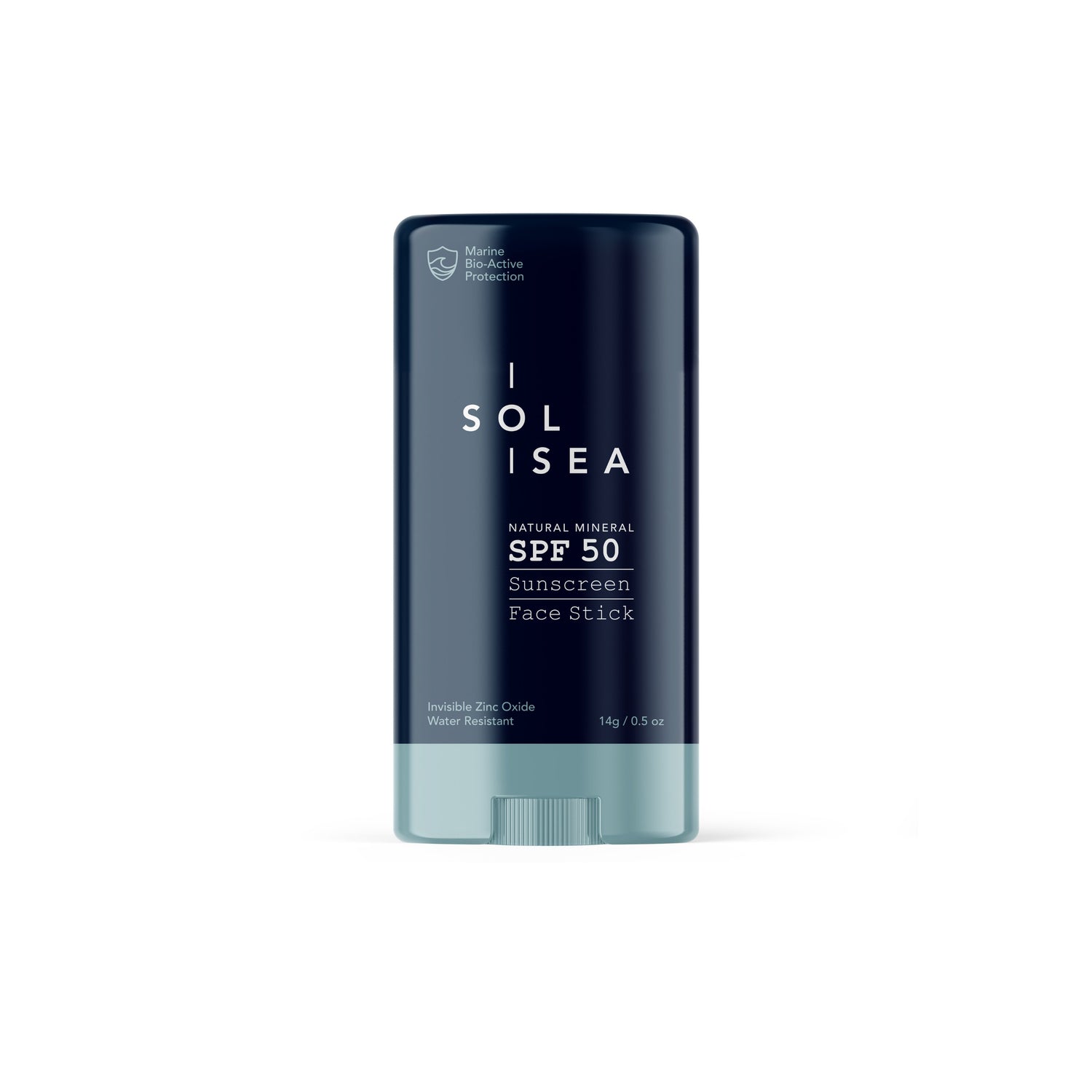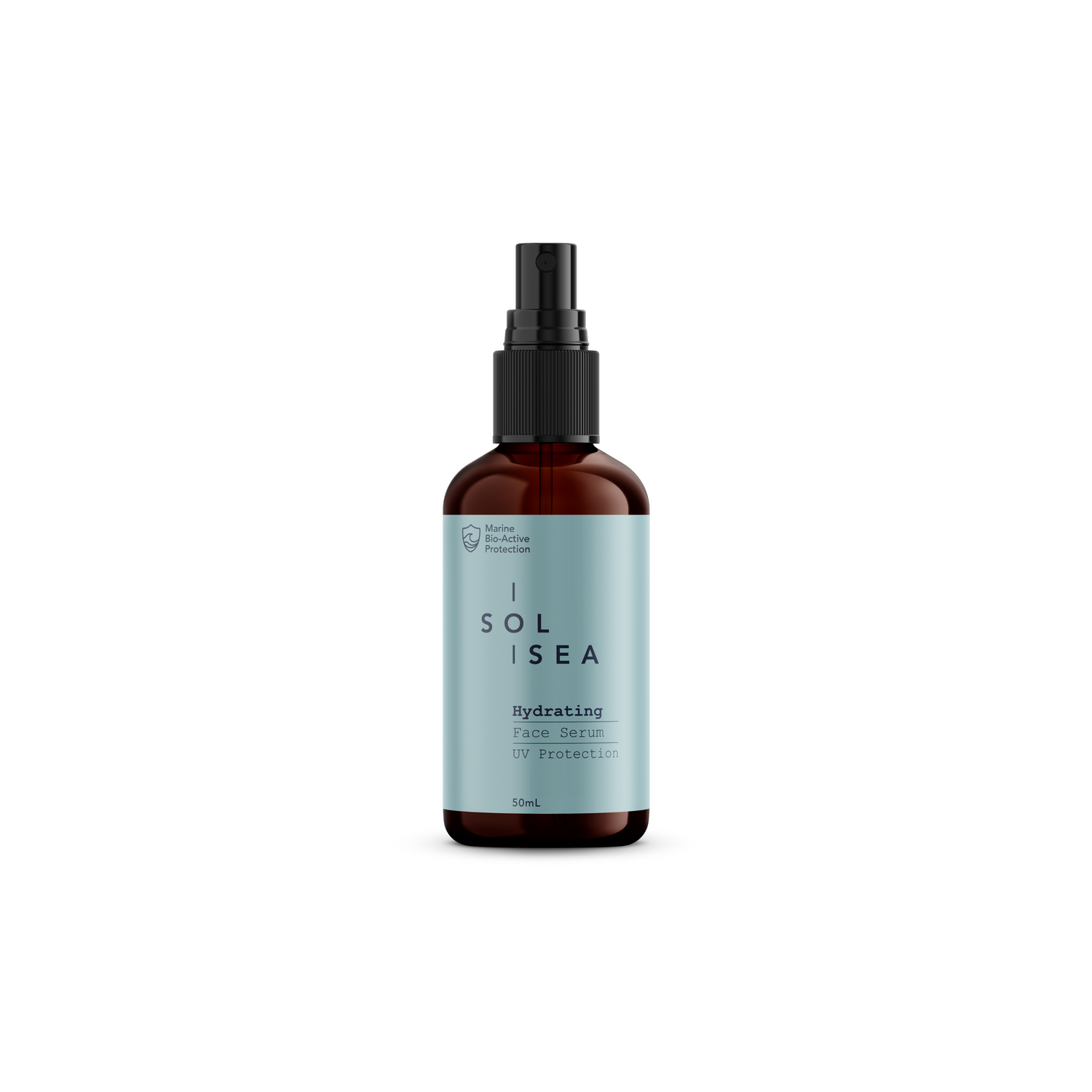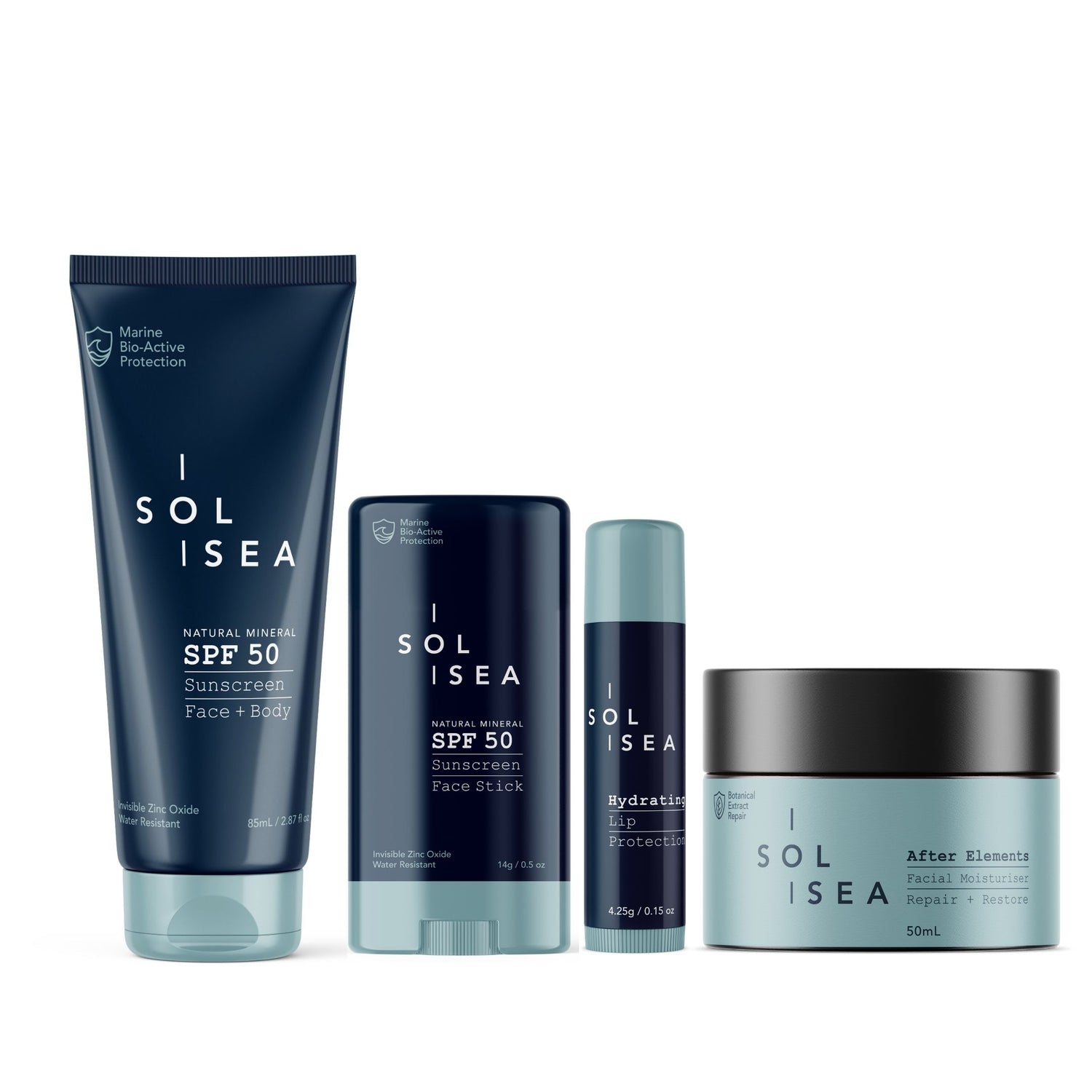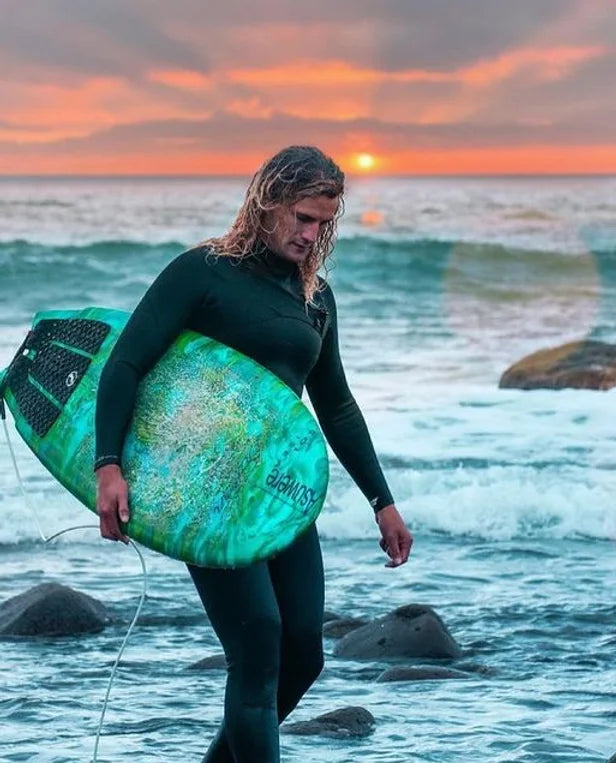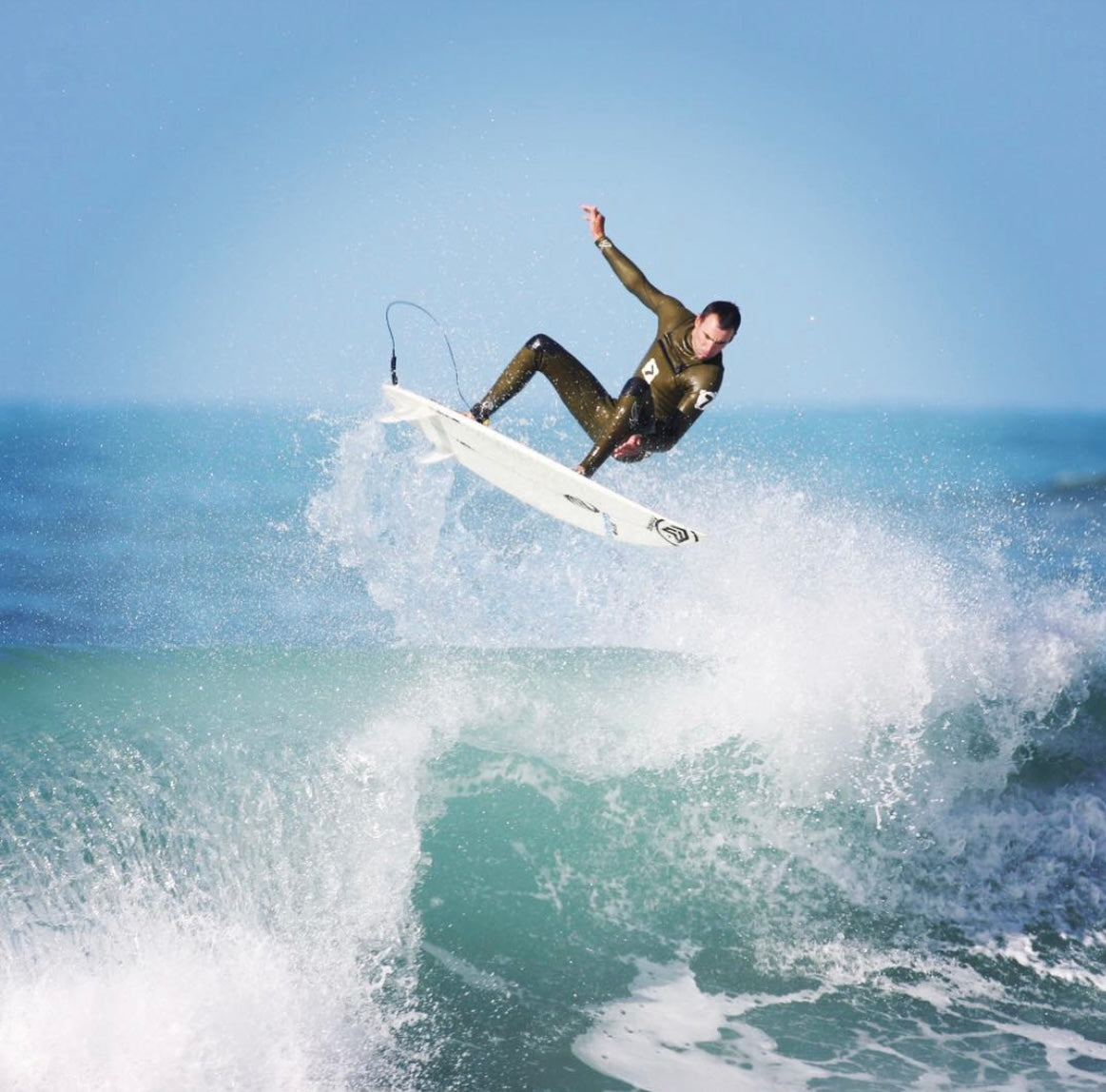FAQs
Collapsible content
What are reef and marine safe products?
Reef safe products are made from natural, mineral based ingredients such as zinc oxide and titanium dioxide: the particles of which protect against UV radiation by sitting on top of the skin. Unlike chemical based sunscreens, these natural UV filters are not absorbed and are therefore less harmful to coral and marine life. The use of non-nano zinc oxide and titanium dioxide particles is also considered to be reef safe because they’re larger in size, so they are unable to be absorbed by marine life.
Sol+ Sea sunscreen products use zinc oxide in nano concentrations, but our particles are coated in other natural and plant derived ingredients - which not only enhances the sun protection factor of our sunscreens, but also protects marine life from small particles. We have thoroughly researched every ingredient in our formulations to ensure that each one does not pose a threat on the environment – and we have removed ingredients that we did not feel confident that they would be entirely marine safe. We have also used as many ingredients that are ECOCERT or COSMOS approved as possible.
What is a natural UV filter?
Natural UV filters are also known as ‘physical UV filters’, because inorganic molecules such as zinc oxide or titanium dioxide act as physical barriers to reflect and block UV radiation from entering the skin. These natural UV filters are very effective and can protect against both UVA and UVB waves. They have also been proven to be stable and safe on the skin and are highly suitable for people with sensitive skin or who are susceptible to allergies, as well as to the environment.
However, zinc oxide and titanium dioxide can often appear white on the skin, known as ‘casting’. Therefore, the invisibility of sunscreen when applied is often achieved by using smaller particle sizes (nano concentrations). This can have some negative effects on coral and marine life if left uncoated. However, our sunscreens use zinc oxide that has been coated by natural and plant derived sources, protecting it against these negative effects and allowing it to be easily applied to the skin. In comparison, some chemical UV filters have been found to contain chemicals that can disrupt the endocrine system and disrupt natural occurring hormones in the body - which is why the use of chemicals such as oxybenzone has been banned in many countries.
What is ultraviolet (UV) light? And why should I protect my skin?
Ultraviolet (UV) light is part of the natural energy produced the sun, or emitted by tanning beds. Both can be dangerous: Ultraviolet A (UVA) is associated with premature skin aging and eye damage, while Ultraviolet B (UVB) is associated with sunburn and skin cancer, including melanoma.2 In fact, studies show that having just five blistering sunburns before the age of 20 can increase your melanoma risk by 80%.3
Despite these risk factors, you can still safely enjoy our amazing outdoor environment by protecting your skin with high SPF, broad-spectrum sunscreen (i.e. it protects against both UVA and UVB), as well as sun-protective clothing, hats and eyewear. It’s also recommended that you avoid tanning beds, full stop.
Source: 2,3. Skincancer.org/risk-factors/uv-radiation
What does ‘water resistant’ mean?
Water resistance is defined as the friction created between your skin and water particles. The water resistant aspect of a sunscreen is measured by determining the sun protection factor of a product before and after it has been in the water for a certified period of time. We claim our products to be 80 minutes water resistant, meaning that they still have the same sun protection factor after being in the water for 80 minutes. However, external factors such as sweating or towel drying can influence the effectiveness of the sunscreens despite these claims, which is why we encourage you to reapply our products regularly for optimal results.
How do we test our products?
Our products are SPF and water resistant tested through Eurofins Australia. Eurofins conduct in vivo and in vitro testing to achieve an SPF rating and test water resistance. At this point in time, our SPF40 products have been tested to an SPF50 standard. However, there have been some inconsistent results to date, ranging from SPF42 to SPF62, so we are currently investigating why such variations are taking place. Therefore, until then we are claiming that our products are SPF40, as we want to be transparent with our customers. An SPF40 sunscreen blocks out 97.5% of UVB radiation, so it offers extremely high protection!
Why should I use Sol+Sea products?
Our sunscreen and skincare products are made from nature, for nature. Our marine life is suffering because of our choices. As ocean lovers, we’re hugely passionate about protecting the environment and our future, so our solution is to produce reef + marine safe skin care. We use mineral and natural UV filters, as well as plant-based ingredients, which have all been thoroughly researched to ensure they do not pose a threat the environment.
Our environment is amazing: it protects, repairs and restores itself from external pressures such as UV exposure, every day. Therefore we have used botanical extracts, marine bio-actives and native New Zealand ingredients to protect, repair and restore the skin.
How do antioxidants repair skin?
Free radicals or ‘reactive oxygen species’ (ROS) are caused by oxidative stress to cells. An increase in the amount of ROS present within the body and skin cells can be characterized by signs of aging such as wrinkles, fine lines, blemishes and uneven pigmentation. Environmental damage such as UV light exposure increases the amount of oxidative stress within the cells, leading to an increase in ROS generation in the skin. This causes inflammation, oxidation at the surface of the skin, plus an increase in sebum secretion and melanogenesis (photo-induced aging). Antioxidant use is important to neutralise and eliminate the amount of ROS through oxidation reactions, which in turn stimulates collagen and elastin production to provide firmness and elasticity to the skin. The addition of antioxidants to the skin also helps to reduce melanogenesis and hyperpigmentation by improving blood flow.
What are marine bio-actives?
Marine bio-active compounds consist of proteins, peptides, carbohydrates and fatty acids. These bio-actives are often derived from marine microorganisms, plants and animals and contain some of the most valuable and beneficial bioactive compounds. They have a variety of biological functions including anti-inflammatory, anti-oxidant, anti-proliferative, anti-hypertension properties and more - which makes their properties valuable especially in skincare. These bio-actives function as active ingredients that are particularly useful in treating acne and wrinkles, providing UV protection and enhancing skin whitening and antioxidant properties to repair damage done to the skin.
Sol+Sea products incorporate the use of Tasmanian Kelp (seaweed) extract and New Zealand Wakame Seaweed Gel into our products. These ingredients contain phyto-actives, known to repair the skin and act to reduce inflammation. Marine bio-actives derived from these ingredients are also rich in vitamins, minerals, amino acids and antioxidants to hydrate, soothe and repair the skin from exposure to the elements. They are also a rich source of micronutrients, which function to restore skin elasticity and brightness. Because they are derived from the sea, we are confident that their use is safe for both humans and the environment, and offers some of the best protection against exposure to the elements. We use ingredients from nature, to protect you from nature.
What are botanical extracts?
Botanical extracts and oils are derived from plant materials that have been concentrated to provide therapeutic, healing and restoring benefits to the body, especially to the skin. Because they are natural compounds, they are often more gentle on the skin and are less likely to cause irritation than synthetic or chemical ingredients.
As our products are natural and mineral based, they contain many botanical extracts, including native New Zealand botanical extracts such as Manuka Oil, Kanuka Oil, Kawakawa Oil, Kowhai Extract and Harakeke Extract. Our botanical extracts provide our products with anti-inflammatory, anti-bacterial and antimicrobial properties as well as soothing the skin and providing it with nutrients. Here’s a deeper dive into our native botanical extracts:
Manuka oil - Manuka essential oil is distilled from the leaves of New Zealand Manuka trees. Soothing and relaxing, it supports increased blood lymph circulation, and helps promote healthy cell renewal.
Kanuka oil – a native oil known for its powerful anti-inflammatory, anti-bacterial, anti-fungal and anti-viral properties. Helpful in combating sunburn, minor burns and skin irritations, as well as acne-causing bacteria.
Kawakawa oil - Kawakawa, a New Zealand native, has long been an important plant in traditional Māori medicine. Its ability to reduce inflammation and irritation means it’s especially beneficial when used topically.
Kowhai Extract – With its natural antimicrobial properties, Kowhai extract helps to calm, condition and moisturise the skin. Kowhai has long been used topically in traditional Māori medicine for itchy skin and abrasions.
Harakeke seed oil - Used in traditional Māori medicine, Harakeke flax seeds are rich in Linoleic Omega-6 EFAs, known to improve dry skin by reducing trans-epidermal water loss and actively support cell wall integrity.
I see your SPF50 products have chemical UV filters, are they good for your skin and reef safe?
Our chemical, organic UV filters are Uvinul A Plus Granular and Uvinul T 150 which provide broad spectrum protection against UVA-I and UVB waves. These have been developed by BASF Chemists as part of their Care Creations range. Both have these products have been tested for both safety and efficacy on the human skin as well as on the environment providing an EcoSun Pass score of over 200 (refer to question… for a definition of EcoSun and how this is measured). This means that neither of these two products displayed effects of aquatic toxicity, endocrine disruption of marine organisms or bioaccumulation meaning they are both marine and reef safe. They are also very safe for application on the human skin as they both display highly effective UV absorption at very low concentrations and have very low skin penetration. This means these filters protect you topically by remaining on top of the skin as they are unable to penetrate into your body therefore unable to cause any type of endocrine or reproductive disruption to you compared to the findings of other commonly used UV filters.
Can I use these these products in the 6 destinations around the world that have banned some chemical UV filters? (Palau, Hawaii, etc)
Yes! Our products do not contain any of the UV filters currently banned at certain countries in the world. These products have been banned because they have found to be toxic and harmful to the marine life and can cause destructive coral bleaching. This has led to the degradation of many coral reefs around the world and disrupting the environmental balance of the marine life in turn having an effect on the living organisms such as fish and algae. Use of these banned filters goes against our beliefs at Sol + Sea. The decline and destruction of the marine habitat in the past 20 years witnessed in destinations such as the Solomon Islands and Hawaii is what has encouraged us to create and promote the use of marine and reef safe skin care.
Do your products use Octocrylene?
No. There have been multiple studies that have found octocrylene to accumulate in various species of aquatic life causing DNA damage leading to developmental abnormalities and effects on reproduction. It has also been found to accumulate in coral causing coral bleaching and reef habitat destruction. At Sol + Sea we focus on ingredients that are both marine and reef safe in an attempt to allow the marine environment to flourish again without the accumulating presence of destructive chemicals.
Because your products are mineral based, do your products white cast?
We do use Zinc Oxide as a mineral based UV filter in our products. However, we use Zinc Clear XP which allows for very minimal white casting. This is because the zinc oxide is processed in combination with vegetable derived ingredients that act as both dispersants and emollients that allows the particles to be spread evenly over the skin, avoiding the white casting appearance associated with most other mineral based UV filters. ZincClear XP provides broad spectrum protection against both UVA and UVB filters and is VEGAN, ORGANIC, ECOCERT and COSMOS approved. In comparison, mineral sunscreen offers immediate protection unlike chemical filters which can take up to 30 minutes to be absorbed into the skin before working effectively.
What's the difference between mineral & chemical filters?
Mineral UV filters include zinc oxide and titanium dioxide which function to sit on the skins surface and block harsh UV rays from entering the skin. Chemical UV filters function to protect the skin from UV rays through a chemical reaction that converts the rays into heat which is ultimately evaporated off the skin. Chemically filters provide long lasting protection and are very easy to apply due to being more dispersible and do not leave a white appearance on the skin like most mineral sunscreens, making their appearance invisible. We use a combination of human and environmentally safe mineral and chemical UV filters to provide broad long-lasting protection which are invisible on the skin.
Do mineral filters absorb into your skin/bloodstream?
No! Mineral UV filters such as Zinc Oxide and Titanium Dioxide sit on top of the skin to reflect UV rays, protecting your skin from UV absorption. However, we only use Zinc oxide in our products as Titanium dioxide has been found to accumulate in our oceans placing potential harm on marine life. However, zinc oxide has been found to be reef safe and has not been found to have any effect on coral bleaching.
How do your mineral & chemical UV filters work? Why don’t you get sunburnt?
Too much ultra violet (UV) light exposure causes sunburn due to increased melanin production within your cells. High UV exposure causes the skin to burn and also accelerates the skins aging process. Mineral UV filters work by sitting on the surface of the skin to block UV rays from entering the skin, ultimately reflecting them away. Chemical UV filters are absorbed into the skin and protect the skin by converting UV rays into heat via a chemical reaction in which the heat is then evaporated of the skin. Both types of filters protect your skin from the harmful oxidative damage that UV rays do to your skin.
Should I use these products in winter?
Absolutely! Our products are designed for use all year around. Although the winter months are often accompanied by less sun exposure it does not stop the UV rays from penetrating into our skin. Our products are designed to defend against free radicals which cause oxidative damage to the skin which can have negative long-lasting effects. Our products use a range of UV filters that have great efficacy and safety for both your skin and the environment! The use of this along with several other naturally derived ingredients and the use of marine bioactives allows protection of your skin against oxidative damaging, providing anti-aging effects all year round.

